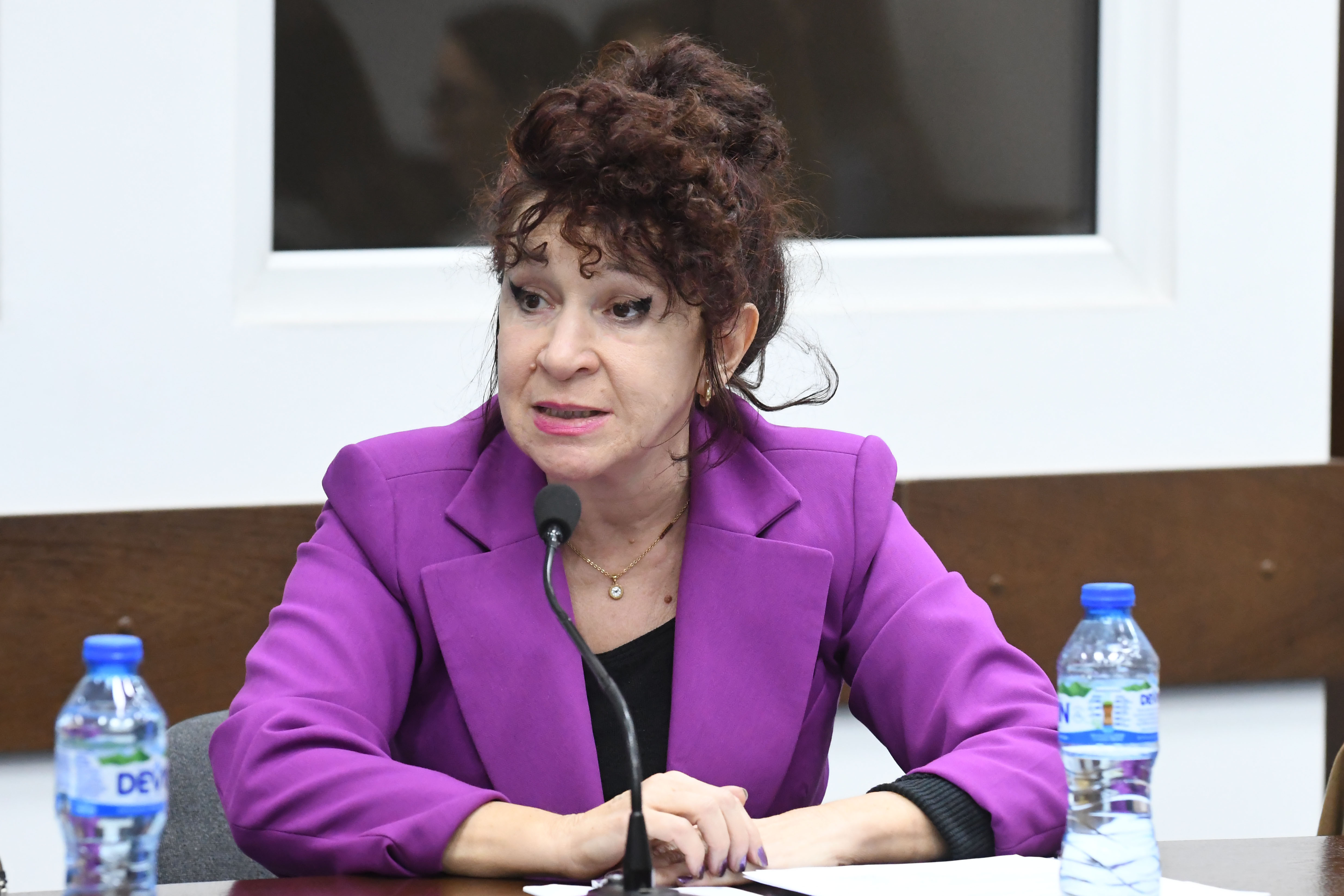ROUND TABLE "THE PROBLEMS IN COPYRIGHT ENFORCEMENT IN THE PHOTOGRAPHY"
On the 24th of February, a round table on "Copyright enforcement in the photography - problems and solutions", was organized at the Institute of Intellectual Property and Technology Transfer. The discussion was organized by the Association of Professional Photographers, the University of National and World Economy and Institute of Intellectual Property and Technology Transfer.
From left to right: Evgeny Dimitrov - manager of the Bulgarian Photo Agency “Bulfoto”, Lilia Yotova - Chairman of the Association of Professional Photographers, Asst. Dr.Ivan Nachev - ad int. Director of the Institute of Intellectual Property and Technology Transfer , Emil A. Georgiev, Attorney at Law, Desislav Vladimirov, Attorney at Law, Viktor Gerasimov - manager of the studio “Film Scan Pro”
Photography is one of the creative industries where the enforcement of copyright has its own specificity, and the participants in this process face both classic infringement cases and new cases, caused by the growing digitization. This requires coordinating the actions of authors and copyright professionals in finding solutions when dealing with the various cases. The late adoption of changes to the Copyright and Neighboring Rights Act also necessitates more active involvement of experts and guild representatives in order to complete the changes. The event coordinates some of these actions.
Asst. Dr. Ivan Nachev, ad int. Director of the Institute of Intellectual Property and Technology Transfer, opened the conference and emphasized the relevance and usefulness of the topic, as well as how imperative it is to hold such forums.
 Evgeni Dimitrov, manager of the Bulgarian Photo Agency “Bulfoto”, and member of the Board of Directors of Association of Professional Photographers and Lilia Yotova - Chairman of the Association of Professional Photographers,
Evgeni Dimitrov, manager of the Bulgarian Photo Agency “Bulfoto”, and member of the Board of Directors of Association of Professional Photographers and Lilia Yotova - Chairman of the Association of Professional Photographers,
Lilia Yotova, Chairman of the Association of Professional Photographers, presented her plenary paper containing research, conducted among 100 professional photographers. The survey emphasis was placed on the violation of the property and especially the non-property rights of the photographer, on the photographic works - an object of intellectual property, namely the recognition of authorship and indication of the author's name when using his photographic work. For example, 72% of the respondents answered that the users do not state their names as a photographer/author when using their works, 58% of them were not aware of their rights and therefore cannot demand that their rights could be clearly formulated when signing contracts.
In conclusion, the main points were indicated of the mass practice in violation of non-property rights, among them: If the photographic works are made to order, the contracting entity believes that by paying for them it takes all the rights and is not obliged to indicate an author, but indicates the name of the legal entity (property holder rights); If the author requests that his name should be indicated, then the users consider that in this case they have the right to use the photos free of charge. If the photographic work resides in a digital environment, a large number of the users consider this to be a sufficient reason to use it for free; En masse, when using photos for interviews, TV shows, etc., the word "personal archive" is written, even if the author expressly requests his designation; It is a practice below the photographic image the photographed person’s name to be written and not the author’s and so on.
The research showed the trends of lack of legal culture and information about intellectual property rights and how the copyright can be protected in practice.

Prof. Dr. Maria Markova, Head of the Department of Intellectual Property and Technology Transfer, ad int., the Institute of Intellectual Property and Technology Transfer
Prof. Dr. Maria Markova, Head of the Department of Intellectual Property and Technology Transfer, welcomed the guests and pointed out that more discussion formats are needed to identify problems, try and model solutions. Last year, with such goal a network "Creative Industries" was created, as a means of achieving this goal is the dialogue between the individual parties involved in the successful functioning of these industries: legislative and executive bodies, academic units and business entities. She assured the attendees that the Institute of Intellectual Property and Technology Transfer to the University of National and World Economy and the Department of “Intellectual Property and Technological Transfer” to the University of National and World Economy, have the dissemination of the knowledge about the intellectual property, the formation and maintenance of a competitive economy and the development of creative industries in Bulgaria as one of their goals and they will continue to be an active party in the search for solutions.
Evgeny Dimitrov, manager of the Bulgarian Photo Agency “Bulfoto”, adverted attention to several practical cases of copyright infringement of photographers related to the media, with an emphasis on the increasingly frequent cases when foreign authors take measures against Bulgarian media violating their rights. Stood out among them is the direct theft of a photo found on Google and the common misconception that what is found on the Internet through Google can be used without compensation; Not understanding the difference between limited and unlimited use; Offender Marginality. He further pointed out the difference between mediators and law firms and how a case won in the EU through the Bulgarian private bailiff, is immediately enforceable.
Viktor Gerasimov, manager of the studio “Film Scan Pro”, talks about the specifics of archival and "found" photography, which in connection with the digitization wave of archives are becoming more and more relevant. Once again, stood out the lack of knowledge of the copyright, which creates a number of problems when digitizing paper photos that are not signed and the original source of the photographic works is not clear; unsigned or destroyed originals - photo tapes and glass plaques proving the authorship of a given photograph.
In conclusion, Viktor Gerasimov emphasized that, in addition to the Copyright and Neighboring Rights Act, it is necessary to pay attention to the Law on the National Archive Fund, in particular Article 54 paragraph (4). The acquisition of personal archival funds or collections by donation or inheritance, does not affect the copyrights on them, especially affecting the photo archives of the museums funds, "Archives" State Agency and photo archives that belong to private collectors.
Useful issues became clear as well in the statements of the two practicing lawyers.
Desislav Vladimirov, Attorney at Law, talked about the economic impact of the copyright protection in the photography and about the intersections between the Copyright Act and the Personal Data Protection Act.
Emil A. Georgiev, Attorney at Law, followed a landmark case study of a case involving illegal footage for election billboards, passed through all courts, to end in a surprising way.
At the discussion it became clear that there is an accumulated solid practice , in the area of photographic works , related to Copyright and Neighboring Rights Act. It was generally accepted that lawyers should be actively used for consultations. The contracts must be consulted in advance with a lawyer, in order to have a preventive and clear protection. For the contract photographers, the contracts should be drawn up with precisely defined rights and obligations, as well as a job description that lists the relevant commitments. Regarding licenses for the assignment of non-exclusive rights, contracts must be signed that clearly define rights and obligations from the very beginning.
Among the active participants in the discussion were Academician Prof. Sasho Draganov, Assoc. Prof. Dr. Nikolay Krushkov, Assoc. Prof. Miryan Miryanav - The National Academy of Arts,, Asst. Dr. Polina Stoyanova, Chief Asst. Prof. Dr. Dimitrina Papagalska, Dr. Yuliana Tomova, Filip Stanchev from the BGNES agency, Tsvetelina Delijska from Board of Directors of the National Association of Professional Wedding Photographers and Videographers, Yana Uzunova - manager of Todor Slavchev’s photo archive - the great Bulgarian photojournalist, Atanas Zgurev - interior designer photographer and other members of Professional Photographers Association and numerous creative organizations.
All participants in the discussion agreed that there is an urgent need in creating an environment as to increase the legal culture and intellectual property training for all participants in the process - photographers, publishers, media, including lawyers, experts and judges, as well as for the general public/users.
Other solutions to the issues raised during the round table discussion were: The upcoming changes to the Copyright and Neighboring Rights Act should be better suited to the specifics of the processes related to the copyright implementation in the photography; Initiating legislative changes related to creating an obligation to indicate the author when using a photographic work; Distinguishing the obligation to indicate the author and the right to use the work; Making contacts with the state authorities and strengthening their role by imposing sanctions on the offenders.
Photos: Ivan Vassilev
